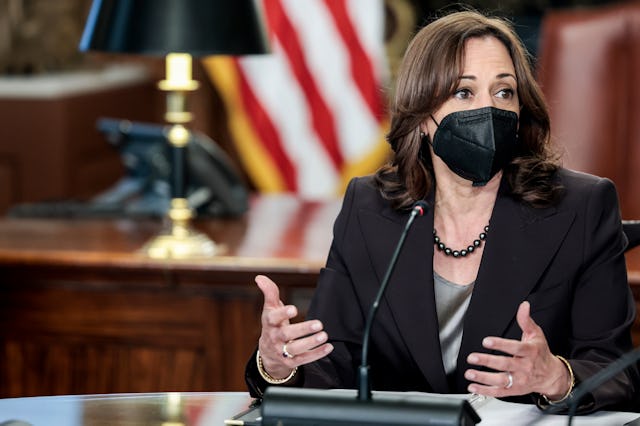Kamala Harris Is Calling All Hands On Deck To Fix Maternal Health Care
The vice president is taking a whole government approach to improving maternal health care, especially for marginalized groups.

The numbers are shocking: The United States has the highest maternal mortality rate in the developed world, and the mortality rate for new moms is three times higher for Black women, twice as high for Indigenous women, and 1.5 times higher for rural women.
Vice President Kamala Harris has had enough. She and the Biden Administration are tackling the issue of maternal health — and especially Black maternal mortality — with a comprehensive, whole-government approach that is urgent and action-based.
“This isn’t just about health care, it’s about treating a mother as a whole human being,” Harris told a group of parenting journalists on Thursday, in a virtual meeting attended by Scary Mommy.
This week — Black Maternal Health Week — Harris met with cabinet secretaries and agency leaders to outline her plan and ask for their help. It’s the first time that such a wide-ranging group of leaders have been asked to contribute this issue, and it’s part of a larger call to action initiated by the administration on this topic.
The plan includes asking 11 different states as well as the District of Columbia to extend Medicaid coverage for new moms from 2 months to 12 months. (Michigan has already agreed to the change.)
It also includes a plan for birthing-friendly hospital designations, so that parents know the best places for care and so hospitals have an incentive to improve their maternity wards. The plan will also invest $4.5 million into community-based doulas, who Harris says are vital to advocating for new moms before, during, and after labor and delivery.
Harris’ push began last year, when she convened the first-ever federal Maternal Health Day of Action — and she’s been working since then to attack the issue from all angles.
For example, she’s certain that improving maternal health extends beyond the medical sphere and will involve numerous agencies tackling multiple systematic problems. For example, she discussed how the Department of Housing and Urban Development (HUD) needs to confront the issue of pregnant people who are homeless or lack secure housing, and she cited the unique challenges that pregnant people in the military and pregnant veterans face, like finding care overseas or living with PTSD.
“The VA has agreed that they are going to invest in research to consider the affect of PTSD on pregnancy,” Harris reported.
Harris also wants to create a new, streamlined federal website with resources and answers for the best care possible.
“Let’s look at the fact that we have all these websites,” she explains. “If you’re a pregnant woman, living in public housing, you’re a veteran, relying on Medicaid — should we require that woman to go on all of those websites to find out her rights and what’s available for her?”
But above all, BIPOC maternal health was at the forefront of her mind. Asked about the issue of poor maternal outcomes tied to Black women being ignored by medical professionals, Harris said that culturally-competent training and research are two of our biggest needs — and two important parts of the plan.
“The reality is that when a Black woman walks into a hospital or an emergency room, she’s not taken as seriously as others,” she said. “Regardless of their education level or economic status, it literally comes down to racial bias.”
Just look at tennis superstar Serena Williams, who recently shared her birth story — and the fact that she could have died if she hadn’t demanded to be heard. Williams’ fame and privileges weren’t enough to protect her.
Harris noted that change also has to take place on a cultural level.
“When it comes to women’s health and their bodies and reproductive care, they feel like they should be quiet about their needs,” she said. “They feel that they’re being judged when they talk about aspects of their sexuality or reproductive health, and we will remind them that it’s not you, it is [medical professionals] who have to listen and respect and understand.”
Harris also shared a personal note — that she is moved by this issue because of her own mom.
“My first level awareness started as a child,” she explains. “My mother focused all of her time on raising two daughters and ending breast cancer. I grew up hearing my mother battle over women being treated with dignity and an ability to take women seriously when they speak.”
It’s incredible that Harris is continuing her mother’s mission and that she will have such an impact.
“I’m convinced that bringing this issue to the forefront will have generational impact in terms of women and their children and their families,” she said. “And there’s no way of this happening effectively without women knowing their rights, and without women being heard.”